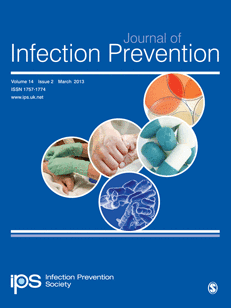
Journal of Infection Prevention
Scope & Guideline
Fostering collaboration in the fight against infections.
Introduction
Aims and Scopes
- Infection Control Practices:
Research dedicated to understanding and improving infection control protocols in healthcare settings, particularly in hospitals and long-term care facilities. - Antimicrobial Resistance:
Studies that explore the mechanisms, prevalence, and management strategies related to antimicrobial resistance, including the impact of resistance on patient outcomes. - Healthcare-associated Infections (HAIs):
Comprehensive investigations into the epidemiology, prevention, and control of HAIs, with a focus on strategies to reduce infection rates. - Outbreak Management:
Research focused on the detection, management, and response to infectious disease outbreaks within healthcare settings, including lessons learned from past events. - Public Health and Policy:
Studies that examine the implications of infection prevention research on public health policies and healthcare regulations, particularly during pandemics. - Education and Training:
Research aimed at improving infection prevention education and training for healthcare professionals to enhance compliance and practice.
Trending and Emerging
- Impact of COVID-19 on Infection Control:
A significant increase in studies exploring the implications of COVID-19 on infection prevention practices, including the effectiveness of PPE, hand hygiene, and facility preparedness. - Digital Health and Technology in Infection Prevention:
Emerging research on the use of digital tools and technologies for monitoring and improving infection control practices, such as electronic hand hygiene monitoring systems. - Behavioral Interventions:
A growing focus on behavioral science approaches to improve compliance with infection prevention measures, emphasizing the importance of understanding healthcare workers' attitudes and behaviors. - Environmental Factors in Infection Control:
Increased interest in how environmental factors, such as water quality and surface contamination, impact infection rates and control strategies. - Interdisciplinary Approaches to Infection Prevention:
An emerging trend towards interdisciplinary research that incorporates insights from public health, sociology, and behavioral science to enhance infection prevention strategies.
Declining or Waning
- Traditional Infection Control Measures:
There has been a noticeable decrease in studies focusing solely on traditional infection control measures, such as standard precautions, likely due to the emergence of more complex challenges posed by new pathogens. - Single-Factor Studies:
Research that examines the impact of single interventions or factors on infection rates appears to be waning in favor of more comprehensive, multifactorial approaches that consider various influences on infection control. - Longitudinal Studies on Established Pathogens:
There is a decline in longitudinal studies focusing on well-established pathogens, as researchers shift towards investigating emerging infectious diseases and their unique challenges. - Descriptive Studies Without Intervention:
Descriptive studies that do not propose intervention strategies are becoming less common, reflecting a trend towards actionable research that can directly inform practice.
Similar Journals
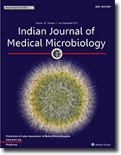
Indian Journal of Medical Microbiology
Empowering Researchers Through Accessible KnowledgeIndian Journal of Medical Microbiology, published by Elsevier, is a pivotal peer-reviewed journal dedicated to the field of medical microbiology, providing a vital platform for research and scholarship since its inception in 1986. With an Open Access model established in 2001, it ensures the dissemination of scientific knowledge to a global audience, enhancing accessibility for researchers, professionals, and students alike. The journal's scope spans critical areas including immunology, infectious diseases, and microbiology, with an impressive trajectory marked by converged years of publication allowing for a comprehensive exploration of evolving scientific trends. As of 2023, the journal holds a Q3 ranking in Infectious Diseases and Microbiology (medical) and a Q4 ranking in Immunology and Microbiology categories, reflecting its significant yet growing impact in the field. Researchers seeking to contribute to or stay updated on the latest advancements in medical microbiology will find the Indian Journal of Medical Microbiology a valuable resource, as it consistently bridges the gap between emerging science and clinical application.
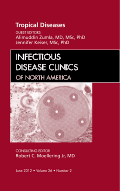
INFECTIOUS DISEASE CLINICS OF NORTH AMERICA
Exploring Critical Breakthroughs in Infectious DiseasesINFECTIOUS DISEASE CLINICS OF NORTH AMERICA, published by W B SAUNDERS CO-ELSEVIER INC, stands as a premier academic resource in the field of infectious diseases and microbiology. With its ISSN 0891-5520 and E-ISSN 1557-9824, this esteemed journal has been at the forefront of disseminating critical research findings and clinical advancements since its inception in 1987. Known for its high impact, the journal ranks in the Q1 category for both Infectious Diseases and Medical Microbiology as of 2023, which underscores its significant contribution to advancing knowledge and practice in these vital areas. Researchers, practitioners, and students alike rely on its comprehensive yet concise reviews and original articles, ensuring they stay abreast of emerging trends and therapeutics in infectious disease management. Although it does not offer open access, the journal remains pivotal in enriching scholarly dialogue and influencing clinical practices in the United States and beyond. Explore this vital publication and join a community dedicated to excellence in infectious disease research.

Infection Prevention in Practice
Fostering collaboration for effective infection prevention practices.Infection Prevention in Practice is a leading academic journal published by ELSEVIER that has established itself as a vital resource in the domains of Infectious Diseases and Public Health. With its Open Access policy implemented since 2019, the journal enhances global accessibility to cutting-edge research and practical insights aiming to reduce the risk of infections in various settings. It proudly holds a Q3 ranking in Infectious Diseases and a Q2 ranking in Public Health, Environmental and Occupational Health as of 2023, showcasing its impact and relevance within the scientific community—particularly with a Scopus rank placing it in the 71st percentile for public health research. Its scope includes the latest advancements, strategies, and practices in infection prevention, making it an indispensable read for researchers, healthcare professionals, and students dedicated to improving health outcomes and combating infectious diseases effectively. The journal operates from its base in the United Kingdom and reaches a global audience, fostering collaboration and innovation in infection control practices.

INFECTION CONTROL AND HOSPITAL EPIDEMIOLOGY
Connecting Research with Real-World Healthcare SolutionsINFECTION CONTROL AND HOSPITAL EPIDEMIOLOGY, published by Cambridge University Press, is a leading academic journal specializing in the critical fields of epidemiology, infectious diseases, and medical microbiology. With a history of publication dating back to 1988 and an expected continuation through 2024, the journal has established itself as a pivotal resource for researchers, healthcare professionals, and students alike. The journal's impact is reflected in its impressive rankings, positioning it in the second quartile for Epidemiology and the first quartile for both Infectious Diseases and Medical Microbiology as of 2023. This esteemed journal is dedicated to the dissemination of high-quality research that informs best practices in infection control and enhances patient safety across healthcare settings. Although access to its content is not open, the rigorous peer-review process ensures that all published articles contribute significantly to the body of knowledge in these vital areas. With a commitment to bridging the gap between research and practice, INFECTION CONTROL AND HOSPITAL EPIDEMIOLOGY remains an essential publication for those committed to the advancement of public health and the science of infection prevention.

Current Infectious Disease Reports
Pioneering Insights for a Healthier TomorrowCurrent Infectious Disease Reports, published by SPRINGER, is a leading journal dedicated to advancing knowledge in the field of infectious diseases. With an ISSN of 1523-3847 and an E-ISSN of 1534-3146, this peer-reviewed journal has established itself as a vital resource for researchers and healthcare professionals since its inception in 1999. The journal's impact in the academic community is underscored by its Q1 ranking in Infectious Diseases for 2023, placing it in the top quartile of influential journals in the field. Furthermore, it holds a respectable position at rank #95 out of 344 in the Scopus database, reflecting its substantial contribution to medicine and public health. While currently not an open access journal, it offers a wealth of articles covering the latest research, case studies, and reviews, making it an indispensable tool for those aiming to stay at the forefront of infectious disease science. As we navigate an era marked by emerging and re-emerging infectious threats, Current Infectious Disease Reports remains committed to providing high-quality, relevant research that supports evidence-based practice and informs future studies globally.

Klimik Journal
Elevating Standards in Infectious Disease Research.Klimik Journal is a pivotal publication in the fields of Infectious Diseases and Medical Microbiology, serving as a platform for researchers, clinicians, and academics to disseminate groundbreaking findings and improve health outcomes. Established in 2010 and published by DOC DESIGN INFORMATICS CO LTD, this journal is dedicated to advancing knowledge and fostering discussions around critical issues in infectious diseases and microbial research. With an ISSN of 1301-143X and an E-ISSN of 1309-1484, Klimik Journal strives to maintain high academic standards despite currently ranking in the fourth quartile in both categories according to Scopus metrics, which highlights the need for continued contributions to the field. Operating from Turkey, the journal is committed to supporting open access options, thereby ensuring wide dissemination of research findings. As it continues to bridge the gap between theory and practice, Klimik Journal is poised to become an essential resource for those looking to stay at the forefront of infectious disease research and microbiological advancements.

Infectious Disease Reports
Advancing global health through groundbreaking research.Infectious Disease Reports is a premier open-access journal published by MDPI, dedicated to advancing the field of infectious diseases. Since its inception in 2009, this journal has established itself as a significant platform for disseminating cutting-edge research, reviews, and case studies, critical for global health. With a commendable Q2 ranking in the category of Infectious Diseases and a Scopus rank of #140 out of 344, it is recognized for its impactful contributions to medical research, holding a 59th percentile in its field. The journal aims to provide comprehensive insights into various dimensions of infectious diseases, ranging from epidemiology to novel treatment modalities. As an open-access publication, Infectious Disease Reports ensures that its articles are freely available to a wide audience, fostering collaborative efforts among researchers, healthcare professionals, and students worldwide. With its ongoing commitment to excellence, the journal plays an essential role in shaping the future of infectious disease research.
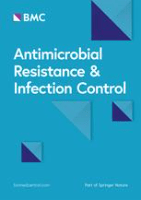
Antimicrobial Resistance and Infection Control
Advancing the fight against antimicrobial resistance.Antimicrobial Resistance and Infection Control is a leading open access journal published by BMC, dedicated to the dissemination of research in the critical area of antimicrobial resistance and its impact on infection control practices. Since its inception in 2012, the journal has quickly established itself as a vital resource for researchers, healthcare professionals, and policymakers, featuring a robust array of studies that address the escalating threats posed by antimicrobial resistance across various contexts. With its impressive Q1 rankings across multiple categories—including Infectious Diseases, Microbiology, Pharmacology, and Public Health—the journal’s influence is underscored by its consistent placement in the upper echelons of academic research. Furthermore, it holds commendable ranks in Scopus, with percentiles placing it in the top tier of its respective fields. The journal serves as an essential platform for innovative research and discussions aimed at curbing the threats of antimicrobial resistance, thereby supporting the global health community in striving for effective solutions to safeguard public health.

GMS Hygiene and Infection Control
Connecting research and practice for optimal health outcomes.GMS Hygiene and Infection Control is a leading open access journal dedicated to advancing knowledge and research in the fields of hygiene, infection control, and public health. Published by GERMAN MEDICAL SCIENCE-GMS, this journal has been offering unrestricted access to its rich repository of scholarly articles since 2013, making significant contributions to the global discourse on infection prevention and control strategies. With its commitment to promoting high-quality research, GMS Hygiene and Infection Control is a vital resource for researchers, healthcare professionals, and students engaged in the pursuit of best practices for improving health outcomes. The journal is built upon a foundation of rigorous peer review and aims to disseminate innovative findings that address current challenges in hygiene and infection control, thereby enhancing clinical practices and public health policies worldwide.
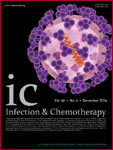
Infection and Chemotherapy
Empowering Knowledge for Better Health OutcomesInfection and Chemotherapy, an esteemed journal published by the Korean Society of Antimicrobial Therapy, focuses on the dynamic fields of infectious diseases and pharmacology. With an ISSN of 2093-2340 and an E-ISSN of 2092-6448, this peer-reviewed, open-access journal has been providing a crucial platform for research dissemination since 2008. Based in South Korea, it boasts a significant impact in the academic community, as evidenced by its Q2 ranking in both Infectious Diseases and Pharmacology categories for 2023. It holds a Scopus rank of 64 out of 272 in Pharmacology and 98 out of 344 in Infectious Diseases, showcasing its prominence and the quality of research it publishes. With a focus on advancing scientific knowledge, Infection and Chemotherapy is committed to fostering essential dialogues among researchers, clinicians, and students, making it a vital resource for those engaged in the fight against infectious diseases and the development of effective therapeutic protocols.